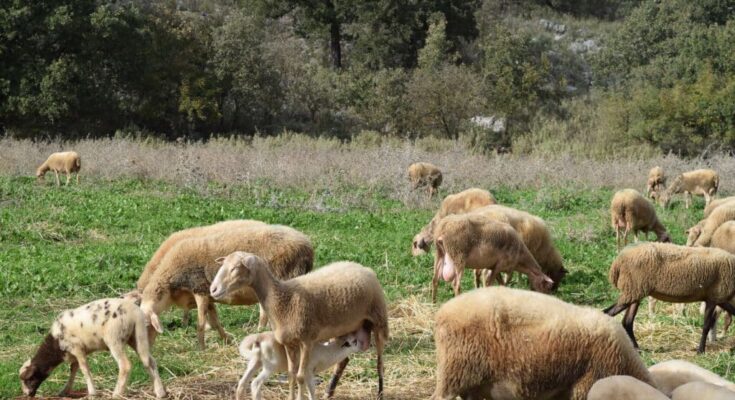
The Minister of Rural Development and Food of Greece, Kostas Tsiaras, has requested additional financial support and compensation for livestock farmers affected by ovine rinderpest. In his letter to the Commission, he detailed that rinderpest has impacted Greece’s sheep and goats.
Minister Kostas Tsiaras requests compensation for farmers affected by rinderpest
Tsiaras highlighted that Greece promptly followed Regulation 687/2020 and adopted additional measures to control and eradicate the disease that has affected sheep and goats in the country.
At the same time, he stressed that this major issue concerns many member states and poses a threat with significant economic implications for the entirety of the EU. Invoking the principle of solidarity, he emphasizes that “this common challenge requires a coordinated and effective response. It is imperative that we coordinate our efforts to protect and support our livestock, ensuring its sustainability and resilience.”
Tsiaras called for compensation for rinderpest losses, noting that “the compensation of rinderpest-related damage must reflect its severity.”
The Greek minister stated:
“Given the serious economic impact of this rinderpest outbreak on our sheep and goat farmers, compensation rinderpest measures must be taken to support those affected. Livestock farmers are at the forefront of this battle, having already suffered significant losses due to other crises such as the severe flooding in Greece and the ongoing challenges faced by all Member States. Therefore, it is imperative to provide financial assistance, not only to compensate the farmers with the highest possible amount for the loss of each animal but also to compensate them for the loss of income.”
The European Commission will explore all options for farming, while respecting European biosafety rules to protect consumers and livestock. Thousands of cattle were culled following the outbreak of rinderpest, which is a severe blow to the country’s sheep and goat farming sector.
The rinderpest crisis could prove devastating to the Greek economy. It threatens Greece’s most important export food product, feta cheese.
The impact of PPR on the global economy
According to Professor Georgios Zakynthinos:
“Peste des petits ruminants (PPR)is a highly contagious animal disease that affects domestic and wild small ruminants, including sheep and goats. It is caused by a virus belonging to the genus Morbillivirus, in the family Paramyxoviridae. Once introduced into a ‘free’ area, the virus can infect up to 90% of a herd. It can also kill up to 70% of infected animals. However, the rinderpest virus does not infect humans.”
The first reported outbreak of rinderpest was in 1942 in the Ivory Coast of West Africa. Since then, it has spread to large parts of Africa, the Middle East, Asia, and Europe. Today, the disease affects more than 70 countries, many of which are at high risk.
Rinderpest-infected countries are home to about 1.7 billion head of small ruminants, or roughly 80 percent of the world’s sheep population. Rinderpest causes annual economic losses of up to $2.1 billion. Beyond this figure, 300 million families are at risk of losing their livelihoods, food security, and employment opportunities.
Additionally, small ruminants such as sheep and goats and their products are important commodities, particularly in Africa and the Middle East. Consequently, outbreaks significantly affect export earnings and create supply shortages. Failure to handle rinderpest could jeopardize national and regional development and set progress back decades.
Further measures to control the goat and sheep rinderpest
A month after the first rinderpest case in Thessaly, the Federation of Livestock Breeders is quite concerned about the disease. The organization emphasized the need to maintain strict measures in preventing any additional contamination so as to protect sheep and goats.
Dimitris Baloukas, Federation President, rejects rumors about relaxing sheep and goat slaughter measures before August 15th. He insists that they should not sacrifice long-term gain for short-term gain. Three months earlier, veterinarians warned that continued understaffing could lead to a health crisis.
The Federation of Cattle Breeders of Thessaly has announced:
“Almost a month after the appearance of the first case of rinderpest in Thessaly and its spread to seven other prefectures of the country, we express our strong concern about the progression of the disease. If we do not eradicate the disease, it will create significant problems for both our sheep and goat herds. From the outset, the Region of Thessaly and the Ministry of Rural Development have implemented strict measures regarding animal movements. We understand that these measures are difficult, but they are the only ones that can yield results and ensure the protection of the export potential of feta, the price of milk, and the viability of our livestock farms.”
Meanwhile, the Ministry of Rural Development has decided to prohibit the movement of goats and sheep. It also imposes a temporary closure of slaughterhouses. Traditional wedding menus on Crete are changing, affecting couples who had planned to serve specific dishes. Instead, the menu will include chicken, pork, or beef due to the rinderpest outbreak.



